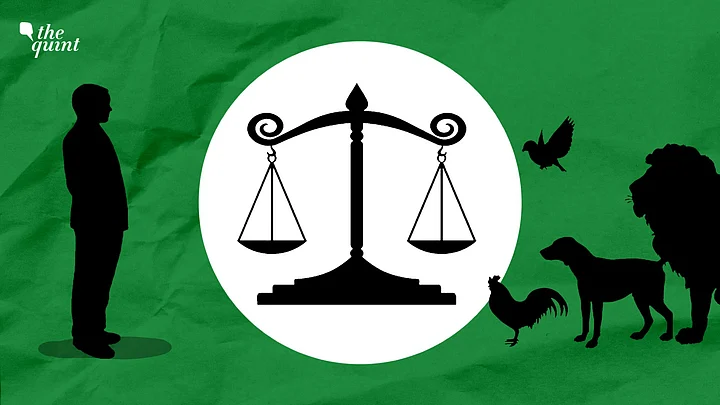As India makes its ascent on the global stage, policymakers, businesses, and civil society are all gearing up to meet India’s collective aspirations. Nevertheless, as we address socio-economic challenges to promote sustainable growth, animal rights remain a cruel blind spot, perennially on the back-burner of public consciousness.
Frequently, reports emerge of organised animal cruelty such as the plight of mules in Kedarnath or elephants at the Amer Fort, or horrific, unconscionable instances of cruelty by individuals often caught on camera.
Several state and local governments struggle to address the stray dog 'menace’, housing bodies regularly obstruct animal lovers and pet parents in violation of laws, and state-run or privately-managed animal shelters are often reported to be in abysmal condition.
The issue is further complicated by its emergence as a battleground for the contestation of socio-cultural and religious identities, seen nowhere more starkly than in the case of state cattle protection laws or the protests and litigation over Jallikattu.
The Prevention of Cruelty to Animals Act
For over a decade now, animal protection organisations have sought higher penalties to deter violations.
While animal activism necessitates winning hearts and minds in the absence of meaningful penal consequences, acts of cruelty would continue unabated. Under the present Prevention of Cruelty to Animals Act enacted in 1960, the punishment for cruelty as a first offence can range between an amount as low as 10 to 50 Rupees.
Similarly paltry fines and three-month imprisonment periods have been prescribed for other offences under this law which has resulted in a culture of impunity.
The PCA Amendment Bill and #NoMore50
The government has been cognisant of this and in November last year published a draft amendment bill for public consultation. The draft bill does three key things.
First, it significantly raises fine amounts and imprisonment periods (including multiyear periods for several offences, on par with other jurisdictions such as the UK, Australia, and Singapore).
Second, it introduces the concept of gruesome cruelty with heightened punishment and the concept of 'five freedoms’ – the biological needs of every animal that each person with an animal in their care must provide for. Third, it provides for the constitution of state animal welfare boards in addition to the national board to coordinate welfare efforts at the state level.
The Bill has received widespread public support, particularly through the #NoMore50 campaign which exhorts the government to pass the bill in the ongoing monsoon session of Parliament.
While the bill was absent from the list of 31 agenda items for the monsoon session, it is reported that the Union Minister of Fisheries, Animal Husbandry and Dairying, Parshottam Rupala has indicated a willingness to get the bill tabled this session itself.
Adopting a Concerted Animal Rights Agenda
As a rising economic power, a leading voice for the global south, and the president of the current edition of the G20, the world keenly looks to India’s moral leadership today.
Adopting a renewed animal rights agenda would demonstrate India’s ethical commitment to the natural world and all living beings in it. Several factors position India to be at the forefront of setting international norms in this regard.
First, there exists a significant religious and cultural ethos of worship of and prohibiting harm to certain animals which can be co-opted to foster a culture of compassion. Second, India still has by far the world’s largest vegetarian population and one of the lowest rates of per capita meat consumption- demonstrating potential for the promotion of plant-based diets, using economies of scale for making plant-based meats and dairy alternatives affordable, and limiting domestic consumption as an obvious source of mass cruelty.
Third, with its large youth population that is increasingly eco-conscious and more receptive to change, the right policy incentives could accelerate the adoption of cruelty-free lifestyles.
India also has a comprehensive body of rules under the Prevention of Cruelty to Animals Act covering diverse animal-related businesses and issues. These include animal birth control, breeders, pet shops, livestock markets, slaughterhouses, performing animals, pet shops, and case property animals.
However, the minimal fines for rule violation and monitoring challenges mean that these detailed guidelines are largely not adhered to in spirit.
Passing the amendment bill at the earliest would help bring to fruition existing regulatory efforts, and be a good first step in ensuring widespread compliance on the ground.
Lastly, policymaking should be supported by a broad ethical framework for animal rights that transcends societal mores and petty politics. It should also be inclusive in that it considers the impacts of change on the livelihoods and health of disadvantaged communities, take a balanced approach to man-animal conflict and implements a phased transition from animal cruelty businesses.
The cultural, religious, commercial and scientific use of animals should all be weighed against reasonable alternatives in light of such an ethical framework.
Most importantly, as the Supreme Court has noted multiple times, this framework must recognise the intrinsic value of animals as sentient beings and their right to live freely. The law should enjoin humans to act as custodians and safeguard these rights; only then can we move the needle from the 'prevention of cruelty' to becoming a society where animals can thrive.
(Aman Borthakur is a public policy lawyer based in Mumbai and a graduate of NLSIU Bangalore. This is an opinion piece and the views expressed above are the author’s own. The Quint neither endorses nor is responsible for the same.)
